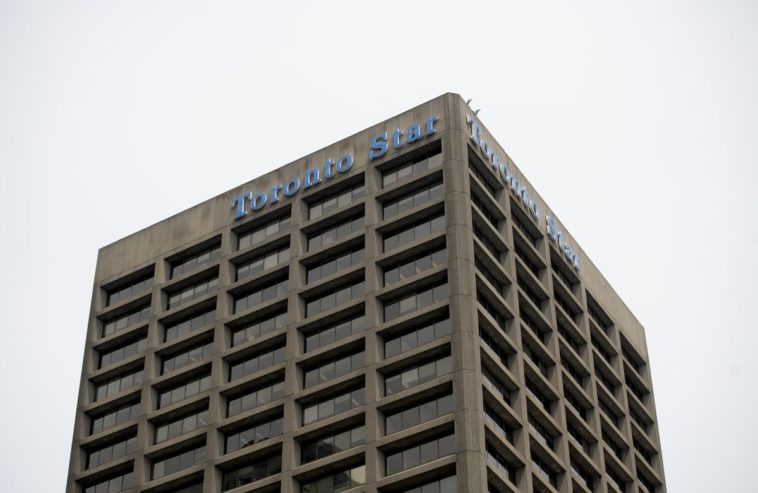/cloudfront-us-east-1.images.arcpublishing.com/tgam/IU3MQV5FKFAQJP4XMFKSGOFDHE.JPG)
Exteriors of 1 Yonge St., long time home of the Toronto Star newspaper.
Fred Lum/the Globe and Mail
The initial public offering of VerticalScope Inc. was “a dream come true,” said founder and chief executive officer Rob Laidlaw, who has spent his adult life building the Toronto digital media company.
But at least one shareholder of Torstar Corp., previously VerticalScope’s largest investor, described it in far less idealistic terms, as the IPO on Tuesday is another reminder of the legacy of value destruction under the newspaper-holding company’s previous owners.
VerticalScope went public Tuesday on the Toronto Stock Exchange at $22 a share after receiving strong demand from investors and raising $125-million. The company’s stock jumped as high as $25.95 before closing at $22.95, up 4.3 percent from the offer price.
“It feels a little surreal, as going public on the TSX was certainly not something I envisioned when I started VerticalScope from my family home in Saskatchewan” as a teenager in the 1990s, Mr. Laidlaw said.
VerticalScope, which runs more than 1,200 websites for communities of enthusiasts of topics ranging from snowboarding to beekeeping, has made more than 200 acquisitions; it generated revenue of $61.6-million over the past 12 months, largely from advertising and referral fees for e-commerce partners that sell to site visitors.
The company plans to use the IPO proceeds to buy more sites in the next year that generate US$20-million in combined adjusted operating earnings. “We have a very warm pipeline,” Mr. Laidlaw said.
VerticalScope’s IPO comes 10 months after Torstar delisted from the TSX. The parent company of The Toronto Star was sold for $60-million to NordStar Capital LP. Torstar also owned dozens of other Ontario publications, as well as a handful of other assets, including 56 per cent of VerticalScope.
NordStar is led by Toronto investors Jordan Bitove and Paul Rivett. Mr. Rivett, now chairman of both Torstar and VerticalScope, was previously president of Fairfax Financial Holdings., Ltd., Torstar’s largest shareholder when it was public.
Torstar’s VerticalScope stake, now owned directly by Nordstar, was worth $180.4-million at Tuesday’s closing price, or three times what the buyers paid for all of Torstar last summer.
“It never occurred to me that [the VerticalScope] stake would be that valuable,” Mr. Rivett said in an interview, adding NordStar “didn’t really put much time into it” last year because it was more focused on plans to fix newspaper operations. “There was really no way to know what it was worth.”
But a last-minute competing bidder for Torstar last July did have a sense VerticalScope and Torstar’s other non-newspaper assets had value, particularly since Torstar had paid $200-million for its VerticalScope stake in 2015.
The Torstar board, led by chairman John Honderich – a member of the five families that controlled the company through a voting trust – accepted a 63 cent-per-share takeover bid by Northstar in May 2020. In July, it received a rival bid for 72 cents a share plus a “contingent value right” (CVR) to the proceeds of future asset sales. The competing offer came from Canadian Modern Media Holdings (CMMH), backed by Dye & Durham CEO Matthew Proud, his brother Tyler, financier Neil Selfe and ex-Ontario cabinet minister Greg Sorbara.
Publicly available documents don’t reveal what CMMH’s CVR was comprised of, other than the fact the bidder valued that extra piece at $45-million, or 50 cents a share. It likely would have included a portion of proceeds from the sale of VerticalScope. The Torstar board never revealed details about the CVR; its contents were sealed by a court order. That prompted a complaint from shareholder and former Torstar executive Patrick Collins to the Ontario Securities Commission that shareholders didn’t get a chance to review the full rival bid.
“That may not be the final insult but it’s damned near the final insult” to shareholders, Mr. Collins said in an interview. He said Torstar never should have invested proceeds from the sale of its Harlequin book business in a stand-alone company such as VerticalScope. “It was dead money” to Torstar, he said. “They never got a penny out of it. If they had invested that money in something that was cash-generating, they wouldn’t have had to sell the company. That’s the legacy the voting trust has to live with – one bad decision after another.”
CMMH’s bid was short lived. NordStar upped its bid to 74 cents, CMMH returned with an 80 cent per counteroffer – with no CVR – but the board had already agreed to Nordstar’s revised offer.
Mr. Rivett said Nordstar plans to keep its VerticalScope stake. “It’s tough to find a digital business that has this growth plus this high margin and real bottom line,” he said. “We think there’s so much opportunity in front of it. For us it’s really about giving Rob the freedom to get bigger and grow that business faster than he was able to do with [Torstar’s] prior ownership.”
Mr. Honderich did not return messages, while Mr. Selfe declined to comment.
Your time is valuable. Have the Top Business Headlines newsletter conveniently delivered to your inbox in the morning or evening. Sign up today.
Published at Tue, 15 Jun 2021 23:37:54 +0000





Comments
Loading…